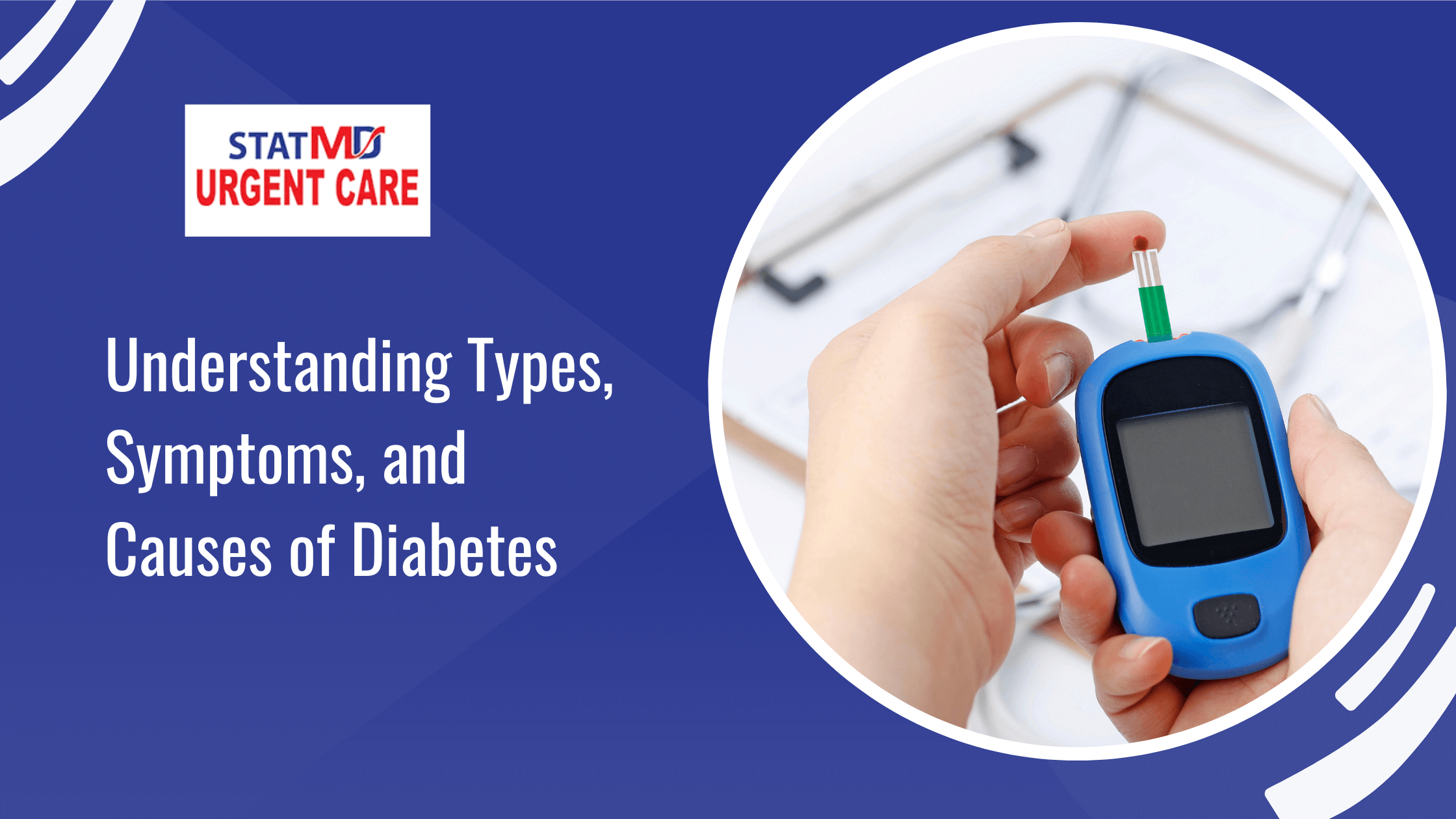
Flu Shots Now Available Don't Miss Out on Limited Supply!
For Young St: (661) 464-5000
For Panama Lane: (661) 464-5001

Diabetes occurs when your blood sugar levels are abnormally above the normal level. It is a chronic yet common condition, affecting nearly 11.3% (37.3 million) of the US population. Out of 37.3 million people, 28.7 million were diagnosed, and 8.5 million were undiagnosed. While it is not life-threatening, leaving it untreated or not effectively managing your blood sugar levels may cause nerve damage, cardiovascular disease, eye damage, kidney problems, Alzheimer’s disease, etc. So, understanding its causes, symptoms, and treatment options is important for taking a holistic approach to diabetes management and leading a fulfilling life.
Diabetes occurs when your pancreas cannot make sufficient insulin or your body cannot fully use the insulin that your pancreas makes. The insulin hormone helps glucose (sugar) to enter your body cells to be utilized as energy. If insulin is not produced or not properly used, glucose accumulates in your bloodstream, increasing your blood sugar levels.
Your blood sugar levels are normal if they are:
Diabetes is a chronic medical condition that occurs when the body is unable to properly regulate blood sugar (glucose) levels. There are several types of diabetes, each with distinct causes, characteristics, and treatments. The main types of diabetes are:
Type 1 Diabetes
It occurs when the insulin-producing cells in your pancreas are attacked and destroyed by your immune system. While it is mostly diagnosed in young adults and children, anyone can develop type 1 diabetes.
Type 2 Diabetes
It occurs when your body does not make sufficient insulin or your body cells become less responsive to insulin (having insulin resistance), thus increasing your blood sugar levels. Though type 2 diabetes mostly affects adults, children can also develop it.
Gestational Diabetes
It occurs during pregnancy due to hormonal changes that cause insulin resistance. Though gestational diabetes goes away after delivery, you may have an increased risk of developing type 2 diabetes in the future.
The symptoms of diabetes can vary depending on the type of diabetes and the individual. Common symptoms of diabetes include:
Besides, patients with type 1 diabetes may develop diabetes-related ketoacidosis (DKA) that causes stomach pain, fruity-smelling breath, vomiting, and labored breathing.
The causes of diabetes, including prediabetes, are complex and can involve a combination of genetic, lifestyle, and environmental factors. Here's an overview of the primary factors contributing to the development of diabetes:
Insulin Resistance: It occurs when your body cells don’t respond to insulin as they did before. Several factors can contribute to insulin resistance, including lack of physical activity, unhealthy diet, obesity, hormonal imbalances, and genetics.
Pancreatic Damage: Damage to your pancreas resulting from surgery or injury can impact insulin production, resulting in diabetes.
Genetic Mutations: Certain genetic mutations can cause diabetes in young adults and neonates.
Autoimmune Disease: Your immune system attacks the insulin-producing cells, causing increased blood glucose levels.
Medications: Prolonged intake of corticosteroids and HIV medications can cause type 2 diabetes.
Hormonal Imbalances: Hormonal imbalances during pregnancy can impact your pancreas’s insulin production, causing gestational diabetes. Other hormone-related conditions like Cushing syndrome (overproduction of cortisol hormone that regulates blood sugar) and acromegaly (overproduction of growth hormone that causes insulin resistance) can also cause Type 2 diabetes.
Your healthcare provider may perform any of the following tests to measure your blood glucose level:
Fasting Blood Glucose Test: It is performed before you drink or eat anything for 8 hours. Glucose levels of more than 125 mg/DL indicate diabetes.
Random Blood Glucose Test: It is performed at any time, despite your fasting status. Glucose levels at 200 mg/dL or higher indicate diabetes.
A1C Test: Also called the HbA1C test, it measures the percentage of your blood sugar levels for the past 3 months. An A1C level of 6.5% or higher indicates diabetes.
Oral Glucose Tolerance Test: It is performed to diagnose gestational diabetes. In this test, your fasting blood sugar levels are measured. You will be given a sugary drink afterward, and your blood glucose levels are measured regularly for the next 2 hours. Glucose levels higher than 200 mg/dL after 2 hours indicate diabetes.
You must visit an urgent care center if you have:
Upon arrival, your urgent care provider will review your symptoms and medical history. They may perform the required tests to determine your blood sugar levels and the type of diabetes you have.
Based on your symptoms and test results, your urgent care provider may recommend any of the following treatment options:
Besides medications, your doctor may recommend the following to manage your diabetes:
At StatMD Urgent Care, we believe in creating a multi-faceted approach for effectively treating and managing diabetes. That’s why we focus on customizing a treatment regimen that addresses your acute symptoms and emphasizes long-term management with dietary recommendations and lifestyle modifications. So you can easily keep your blood sugar levels in check. Contact us today if you are looking for reliable urgent care for diabetes treatment.